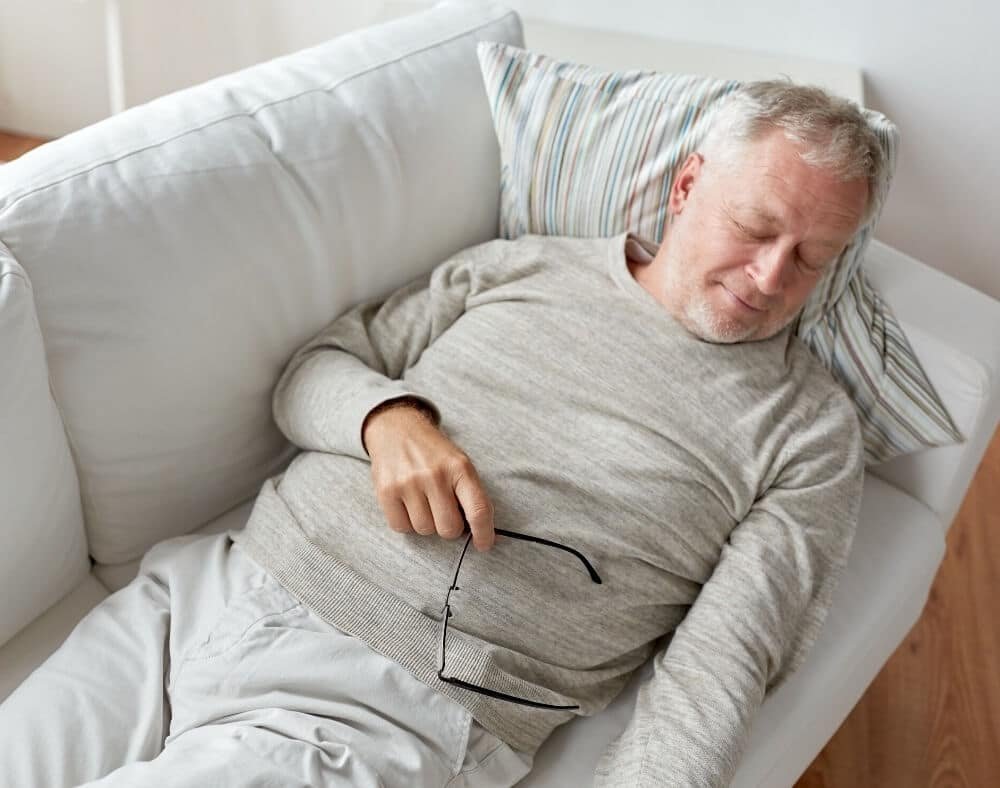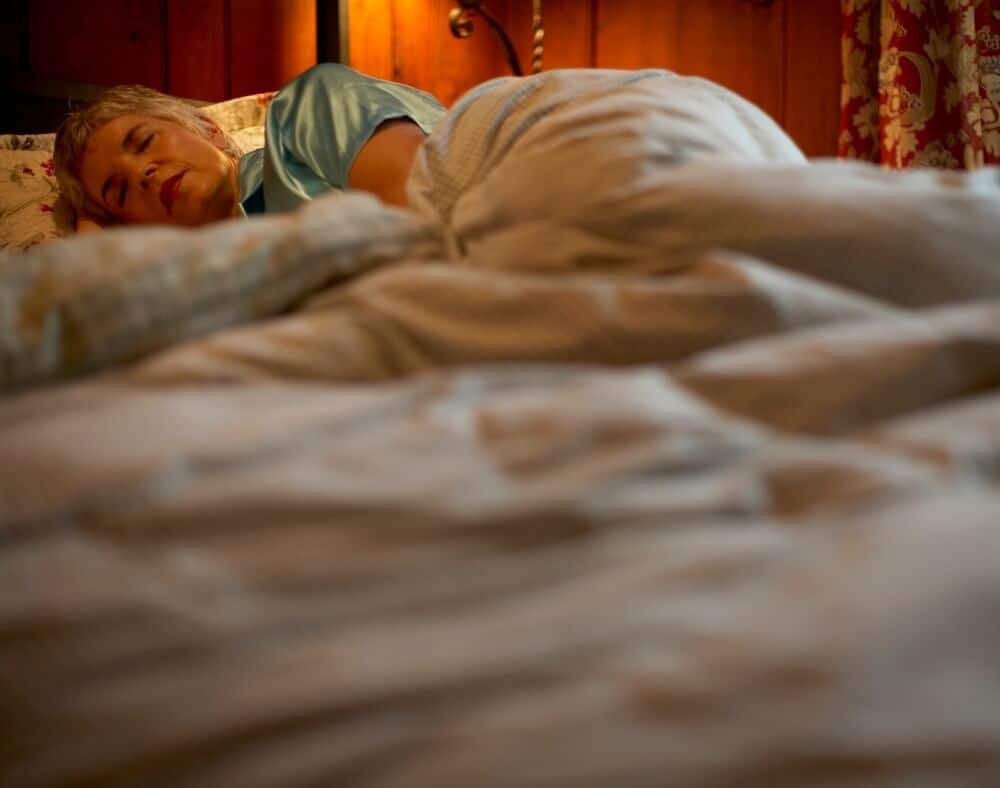Many seniors end up suffering from both dementia and insomnia at some point in their lives.
Insomnia affects about 20%-35% of persons who have dementia.
It can be described as a sleeping disorder that causes people to have trouble falling or staying asleep.
The condition can come and go and it can also be chronic or acute.
Acute or short-term insomnia lasts from a single night to a few weeks.
Long-term or chronic insomnia can go on for a minimum of three nights every week to three months or more.
Managing Dementia and Insomnia
Lack of proper sleep often leads to reduced functioning during the day and can also lead to increased health problems that may reduce the quality of life.
Not getting enough sleep can also make dementia worse.
This not only causes strain on ill individuals but caregivers as well. It is not uncommon for persons with dementia to experience early institutionalization because of insomnia.
When caring for a person who has dementia and is experiencing insomnia as well, there are a few tips you can use to manage sleep problems, which we cover in detail below.
Treating Any Underlying Conditions

A person with dementia can experience sleep problems because of some untreated ailments or pain.
Some medical conditions like sleep apnea, depression, or restless leg syndrome can be the cause of sleep issues.
Visiting a doctor as soon as you spot the signs of insomnia can help treat such conditions or alleviate pain to help individuals with dementia enjoy a good night’s sleep.
If you want to know whether a person has sleep apnea, you can watch them as they sleep.
Most people with this condition will stop breathing momentarily because it causes them to pause while breathing.
An individual with restless leg syndrome will twitch or move their legs uncontrollably. Some individuals may experience burning, tingling, or fizzing sensations in the legs.
Avoid Over-Sleeping During the Day

One of the reasons why a person with dementia may not sleep well at night is because they sleep too much during the day making it hard to get some shut-eye at night.
For this reason, it is important to ensure that the individual with the neurodegenerative disease does not spend most of their days sleeping.
While it is okay for a person to take short naps during the day, they should not end up sleeping for hours.
These should only last 30 minutes to an hour.
This means that you have to come up with fun and engaging stuff for the suffering person.
Encouraging physical activity is also important as this promotes better sleep thanks to a better flow of blood in the body.
It will keep them occupied during the day so that they do not resort to sleeping even when they do not have to.
Keeping a person busy during the day also means that they will be tired by the time the sunsets.
This is something that can help them fall asleep faster because their bodies will be craving some relaxation.
Stay Away from Stimulants before Bedtime

Nicotine, caffeine, and alcohol are some of the things that can interfere with sleep.
To manage dementia and insomnia, limit or completely avoid these substances when a person is about to retire to bed.
Effects of caffeine can last many hours; thus, end up interfering with sleep. This substance can lead to frequent awakenings, or challenges initiating sleep.
Although alcohol can offer a sedative effect after a few hours of consumption, it is not advisable to take it at night because it often results in arousals as well as a non-restful night’s sleep.
It is also recommended that you keep away from stimulates during those wakefulness periods at night.
These include things such as engaging in conversations, reading books, or keeping the TV or radio on.
Using Light Therapy

Many people agree that exposure to light therapy especially during the daytime can help maintain the circadian rhythm.
The main source of this light is ideally the sun.
Take the person with dementia outside, and when the sun sets, the body will know that time for sleeping is around the corner.
If the sun is not an option, you can use some special lamps that are designed to emulate light from the sun.
Several studies reveal that light therapy is most beneficial for people with mild to moderate dementia.
Creating an Ideal Sleeping Environment

A person’s sleeping area can end up affecting the quality of sleep.
You want to make sure that the person with dementia and insomnia gets a comfortable place to sleep every night.
Some of the things that can help with the creation of a great sleeping place include:
- Where possible, make sure that the individual with dementia only uses their bedroom to sleep or for intimacy. They should move from the room when they wake and not have any meals there. This way, they will associate the specific room with sleeping.
- At night the bedroom should remain quiet and relatively dark. Blackout curtains are a great option for eliminating disturbances coming from outside. Persons who insist on sleeping with lights can use low levels ones. If there is noise from the surrounding areas, white noise can help with masking it out. Some experts state that using lights with violet colors helps to induce drowsiness.
- The temperatures inside the bedroom also need to remain at comfortable levels.
- Beds should be well made and comfortable. Remember to change sheets, pillows, and comforters. You can also invest in special pillows and mattress pads that work for the specific sleeper.
- Keeping the room safe may also help. You can re-enforce safety by using the appropriate window and door locks. Motion detectors and door sensors can also be used to alert caregivers when a person starts wandering.
- You can consider placing a clock next to the bed that shows a person whether it is day or night.
- A person with dementia can try and take a hot shower or bath before bedtime. For some people taking warm milk or cuddling with their favorite soft toy can help with relaxing before sleeping.
Create and Maintain Schedules

Regular routines can help people with dementia sleep better.
Encourage the individual with dementia and insomnia to go to bed and wake up around the same time every day.
A consistent sleep schedule can enhance circadian rhythm to help persons with dementia not only sleep faster but also have better quality sleep.
It can also help to maintain regular meal schedules.
Take Steps towards Reducing Stress

People with dementia are likely to experience stress that can make them suffer from insomnia.
As a caregiver, you can try the following tips to help the person with the neurodegenerative illness reduce stress and probably sleep better.
Let the weak person enjoy some alone time as they engage in the things they love to have a bit of fun and forget about their troubles for a while.
It can be anything from doing hobbies like knitting, playing music, watching movies, and so forth.
They can also socialize with their loved ones as they catch up and make each other laugh one of the best ways to relieve stress.
Help the person talk about their expectations. If some are unrealistic, find a soothing way to tell them that they have to accept that some things cannot be changed.
Although the person may shy away from support, try and give them as much as you can without forcing it so that you can reduce and finally eliminate the harmful effects of stress on the body and mind.
Eating a Healthy Diet

A well-balanced and nutritious diet is important for everyone, more so, individuals with dementia.
When it comes to mealtimes, make sure that persons with the illness do not take heavy meals and processed foods just before bedtime.
If possible they should take their last meals at 6:00 PM. Anything a person eats after this should be low in carbs and sugar.
Experts state that eating some foods around bedtime can help induce sleep.
For instance, calcium is known to help in the production of a natural hormone called melatonin that is responsible for inducing sleepiness.
This means that a person can have a glass of milk before they go to bed.
Oatmeal is another option to consider.
Using Medicine

Most of the time, it is recommended that you try and use natural therapies when dealing with dementia and insomnia. Sadly, this may not work for everyone.
In such cases, it is important to consult a doctor who can prescribe drugs that can help with insomnia.
Sedatives, sleeping pills, and tranquilizers are examples of medications that a person can take to help with the situation.
Some doctors may even recommend the use of sleep aids that come with some kind of sedating antihistamine.
Keep in mind that there are some drugs a person may be taking that could be responsible for sleep problems.
The doctor should replace these as soon as possible with alternatives that will not negatively affect a person’s sleep.

